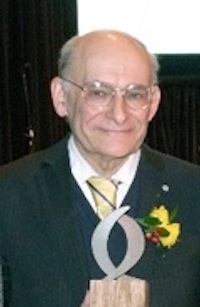Winnipeg lawyer David Matas received a distinguished alumni award from the University of Manitoba (U of M) at a gala on the evening of May 1. Matas joined four others – Chau Pham (young alumni), Scott Cairns (professional achievement), John Bockstael (service to U of M) and Bruce Miller (community leadership) – in receiving the award. The event featured performances by U of M alumni, including Juno-nominated performers Erin Propp, Larry Roy and Desiree Dorion.

On stage, Matas told attendees he is currently working on an autobiography, with the working title Why Did You Do That? He said, “The book seeks to justify my human rights activism. Writing the manuscript has made me introspective, attempting to justify my behavior to myself.”
There are pluses and minuses to receiving this award, said Matas, with a smile. “To be sure, it’s a boost to my self-esteem … [though the] downside is the increased expectations.”
Matas, who is a human rights lawyer in Winnipeg and senior legal counsel for B’nai Brith Canada, said that after having received the Order of Canada, “it didn’t become any easier. To the contrary, afterwards, my court opponents continued as before – disagreeing with everything I had said and adding that my arguments weren’t worthy of the Order of Canada. I hate to think what lies in store for me in court now that I’ve won the distinguished alumni award,” he joked, receiving warm applause.
Outside the courtroom, Matas more seriously added that the award might add welcomed weight to his positions and opinions. “I draw your attention to one particular position of mine: that the University of Manitoba should not be hosting Israel Apartheid Week.
“The decision this year to allow Israel Apartheid Week to go forward was particularly troubling in light of the fact that the University Student Union had stripped the sponsoring group of its student status and funding.”
Next year, as in past years, Matas said, he will be telling the university, “Don’t give this week a university forum.”
Later, he added, “Human rights advocacy, I realize, is often not one-dimensional – opposing rights against wrongs – but, rather, rights and against rights, and determining where the balance lies.”
Thanking the Alumni Association, Matas said, “It gives me the incentive and reinforcement to engage in this debate in years to come. The debate about where the balance lies is one in which we must all take part.
“I never drop a human rights cause until it’s resolved. I’ll be at it until the problem disappears – or I disappear.”
Rebeca Kuropatwa is a Winnipeg freelancer writer.
